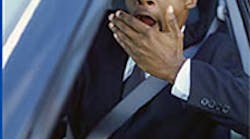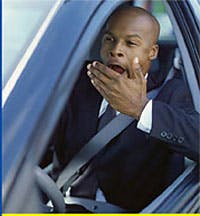But what happens if you CAN’T get that restorative sleep? What if, with 10 or even 12 hours off per day, a driver finds himself (or herself) tossing and turning for hours, ending up fatigued and groggy at the start of their next shift?
Such “sleep problems” are actually fairly widespread in the U.S., if a new study is to be believed, and certainly not just limited to big rig operators.
In a survey of 1,001 adults aged 18 and older sponsored by sleep-aid maker MidNite, some 52% of respondents reported they suffered from a lack of sleep.
[Here’s some sleep advice from HealthNation.]
Of those dealing with sleep issues, the survey found that problems falling asleep and staying asleep occur about equally; 70% and 67% respectively. However, waking in the night is the most common sleep problem for women 35 and over, while for men 35 and over the most common issue is falling asleep, according to MidNite’s poll.
Here are some other interesting factoids dug up by this poll:
- Of those who have trouble sleeping 20 or more nights a month – not only for women, but for people who have trouble sleeping in general – 80% report waking in the night.
- Age affects the frequency of sleep issues. Americans over 34 experienced sleep problems more frequently (an average of 13.2 nights per month) compared to their younger counterparts (aged 18 to 34) who experience sleep problems an average of 11.7 nights per month.
- On average, those with difficulty sleeping have trouble nearly half the year,or 12.5 times a month.
- Only half of people (49%) experiencing sleep issues consider it to be a problem.
- People with sleep problems said they prefer over-the-counter (OTC) sleep aids to prescription sleep aids, with 61% of those with difficulty sleeping saying they use a sleep aid. About half use an OTC sleep aids, while the usage of prescription sleep aids is considerably lower (19% among those with sleep problems).
- The main reason adults with sleep problems don't use over-the-counter (OTC) sleep aids is "fear of dependency."
Dr. Lisa Shives, M.D., founder of the Chicago-based Linden Center for Sleep and Weight Management, noted in the study that she finds people can be hesitant to confront their sleep problems and seek medical help, which may be one reason only 49% of those with sleep issues consider it to be a “problem.”
Just goes to show that while you can legislate “off-duty” time for rests and sleep, the human body may not cooperate with such rules. It’s just part on the ongoing struggle against fatigue for the motoring public as a whole, not just truckers.




